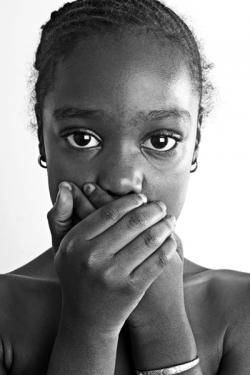Serendip is an independent site partnering with faculty at multiple colleges and universities around the world. Happy exploring!

Choosing to be Silent

When I see this picture of a raindrop about to fall off the tip of this leaf, I can only imagine how quiet it will be in comparison to all the other sounds of nature surrounding it. There’s something so peaceful about this picture that makes it hard to remember that if we had the ability to zoom out and look beyond that particular leaf, as well as tune into our other senses, we might even forget the other sounds we would hear such as the rustling of leaves and the deafening sound of cicadas. Maybe it’s the focus of the camera on this leaf that makes it hard to think about what else is surrounding it. I imagine this leaf being in the woods, and thinking back on moments of when I was silenced, the woods probably would’ve been a good place to get away from it all.

The Topic of This Piece Has Been Censored

It’s ironic that the first topic I thought of when considering whether I’d ever felt silenced was a topic I’ve silenced myself from sharing on this blog. When Anne spoke to our class about the use of the blog, she said she hoped that by the end of the class we could each take responsibility for our words and use our given names in our blog posts. My silencing is less about taking responsibility for my words, and more about how willing I am to open myself up to others. And though my own name is slightly obscured on this blog, my posts all show up in a search of my full name on Google. For me, that’s terrifying.
What I’ve come to learn about interactions on the Internet is that nothing goes away. Last year, I wrote a post about the MTV debate that was occurring here at Bryn Mawr. Recently, I searched “MTV” and “napkin notes” on Google to see what came up and was surprised to find a blog citing my post from someone at the University of Texas. That’s not a problem – it’s exciting to realize that perfect strangers can be interested by what I have to say. In addition, because I still stand by what I said in those posts, I’m fine with them being associated with me.

Seeing without speaking
In class Thursday I was particularly haunted with the picture above, JHunter's visualization of silence. While my interpretation of “Bouquet of Eyes” varies from hers, I am grateful for the push towards looking differently at a subject that I thought I had adequately explored. It is this new interpretation that I will use now to speak toward my own experience with being silenced at my summer job.
This summer I had the misfortune of learning that silence can sometimes be a group phenomenon, and it is in these particular instances when the absence of voice can be the most dangerous. From June to August I worked at an overnight camp for underprivileged youth, like I have for the past three summers. The counselors range in age from 17-21, not much older than the children we watch over. It is difficult for me to talk about what happened this summer in a composed way, because the happiness and welfare of the campers was and still is my utmost concern and to see that threatened was infuriating.

This American Life: Act V
To give a little background, This American Life is a PRI radio show where each episode is dedicated to a theme that reflects, well, American life. The link above leads you to an episode called Act V and is without doubt one of my favorites. Succinctly put, it follows a group of men in prison who are putting on the fifth act of Hamlet. Hope you enjoy.
Reflections on Paper One
When I was doing Thoreauvian Walk, I sensed the rhythm of nature by listening to the cicadas' songs and capturing the wind that flowed between my fingers. I felt so peaceful and free, but I also felt that my mind was going blank--it wasn't as amazing as I had imagined.
Then, I decided to walk as usual. I walked from place to place with a destination in mind, and I also enjoyed myself. As for me, I feel I am energetic no matter I walk in which style.
Walking as a freeman was a whole new experience to me, and although I wasn't used to it, the shadow of freedom surrounded me. Walking as a normal person, on the other hand, allowed me to discover the beauty of daily routine.

9Sept2012 S2: Light&Silence

When looking at Jomaira’s images, I was actually a little startled. Not because their image reflects a dimension of silence I seldom imagine, but because several years ago, I would have likely put up a very similar image of silence. What startled me was that I didn’t realize how my first-gut connotations of silence have shifted in recent years. Before, my initial thoughts and feelings of silence would have been ones that were associated with oppression, the inability to speak, absence, dark—concepts that I think are evoked when looking at their images. But recently, I often associate silence with more positive notions and less tension. Just as one example of how and why, I think of silence and light together and chose my photo accordingly. We often forget how remarkably silent light is given what it does. Light, unassuming and silent, has capabilities that range from giving us the capacity of sight, the dichotomy of day and night, and also life itself.

How Silence Evolved in My Childhood
While scrolling through the visuals of silence on Serendip, I found myself deliberately returning to the image of Irene’s bedroom. I was captivated by the soft lighting, the warm brown colors and the simplicity of its decoration. I was reminded of my own bedroom back home. Similarly, the image of my bedroom is a place of peace and rest with its array of books, wall of mirrors and made bed. While I enjoyed seeing a bedroom that projected similar sentiments of comfort and intimacy, I know that the appealing visual of my bedroom is a facade. In contrast to the expected hospitable nature of a bedroom, my bedroom was a rather lonely and confined space for much of my life. So, as much as I wanted to feel the welcoming silence emanating from Irene’s image, I could not ignore how it was a visual reminder of my isolating relationship with silence.
We Write Differently, How and Why
Hey everyone! I just finished reading the one and half chapters of Solnit’s “A Field Guide to Getting Lost”, and I had some exciting and funny experience that I am eager to share with you all. I am very attracted by a sentence which says to lose oneself is to be “utterly immersed in what is present so that its surroundings fade away.” While reading it, I was thinking “that is the right words I was looking for in yesterday’s essay!” In the essay I wrote for this week, I talked about my experience sitting on the grass slope and relaxing. Just now, I referred to the Friday essay and see what exactly Iwrote to express it. Surprisingly I found out that I actually said “I didn’t feel I was at lost.” This is really interesting! How we define a word definitely influence how we express. In Solnit’s book, I totally loved her idea about losing oneself and the way of her expression. However, before I read her way of saying it, I used a completely opposite way to describe the same thing. In my Friday essay, by using "lost", I was trying to express the situation where people feel idle, bored, and worthless. But Solnit’s “lost” is to be “fully present, and to be fully present is to be capable of being in uncertainty and mystery.” I want to share this reflection with you in order to make a point that, sometimes even when people are trying to say the same thing, they use different words to express themselves. To avoid misunderstanding, we need to patiently communicate and develop our skills on expressing.



